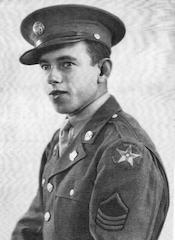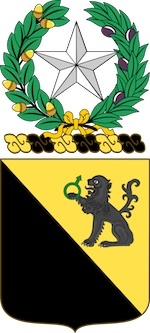 Staff Sergeant Bennie Fritz Lindemann
Staff Sergeant Bennie Fritz Lindemann
United States Army, World War II
124TH Cavalry Regiment – “Horse Soldiers”
 October 1, 2021 - Bennie Fritz Lindemann was four years old when he immigrated with his parents to the United States arriving at Ellis Island, New York on the ship Albert Ballin just before Christmas, December 16, 1924. He was born January 15, 1900 in Hamburg, Federal Republic of Germany to Mina Bertha Duss and Richard Arnold Lindemann. His parents had also been married in Hamburg the year before. The family settled in San Antonio, at 616 North Alamo Street where Father Albert found employment as a gardener. On December 2, 1925 they made application to become US Citizens.(1) By the 1940 Census the family had moved to 712 North Bowie Street in Seguin, Gaudalupe County, Texas where his father was now employed in the newspaper business as a linotype operator. There had also been additions to the family and Bennie now had a sister, Lillian “Sonny” (1925) and two brothers, Herman Albert (1930) and Gerhard Alfred “Butch” (1935). Bennie was now 20 years of age, a high school graduate and employed as a salesman in an unspecified industry.(2)
October 1, 2021 - Bennie Fritz Lindemann was four years old when he immigrated with his parents to the United States arriving at Ellis Island, New York on the ship Albert Ballin just before Christmas, December 16, 1924. He was born January 15, 1900 in Hamburg, Federal Republic of Germany to Mina Bertha Duss and Richard Arnold Lindemann. His parents had also been married in Hamburg the year before. The family settled in San Antonio, at 616 North Alamo Street where Father Albert found employment as a gardener. On December 2, 1925 they made application to become US Citizens.(1) By the 1940 Census the family had moved to 712 North Bowie Street in Seguin, Gaudalupe County, Texas where his father was now employed in the newspaper business as a linotype operator. There had also been additions to the family and Bennie now had a sister, Lillian “Sonny” (1925) and two brothers, Herman Albert (1930) and Gerhard Alfred “Butch” (1935). Bennie was now 20 years of age, a high school graduate and employed as a salesman in an unspecified industry.(2)
The first peacetime military draft (Selective Training and Service Act of 1940) was enacted on September 16, 1940 and required all men between the ages of 21 and 36 to register with local draft boards. Bennie two months shy of age twenty-one, voluntarily enlisted in the US Army on November 18, 1940 and was assigned to the 124 Cavalry Regiment (Horse), Texas National Guard that had just been mobilized for active duty at Waco. Initially stationed at Fort Bliss, El Paso they were reassigned to Fort Brown in Brownsville and Fort Ringgold in Rio Grande City replacing the 112 US Cavalry. In September 1941 the Regiment participated in the Louisiana maneuvers and patrolled the border with Mexico from Brownsville to Laredo. The Japanese attack on the Naval facilities at Pearl Harbor Hawaii, December 7, 1941 brought the United States into a second World War that would be fought on two fronts, Europe and the Pacific. While stationed at Fort Ringgold Bennie married Miss Bonnie Dell Cox on January 2, 1943 at Center, Shelby County, Texas. After its sister regiment, the 112th Cavalry was sent overseas, the 124th Cavalry remained a part of the 56th Cavalry Brigade until 12 May 1944, when it was moved to Fort Riley, Kansas. At that time, the Regiment was the last horse-mounted regiment in the United States Army.(3)
Fellow soldier of the 124th, Lyle Mitteis said in a July 7, 2011 interview he gave to the “Fence Post”, a nationwide agricultural newspaper based in Greeley, Colorado “There were 11,000 horses and 11,00 men. They were beautiful horses,” Mitteis recalled. “Their shoes were taken off; the Lieutenant wrote down their serial numbers and turned them loose. We just stood there watching as they ran down the valley … it was a sad day; we had become attached to our horses.”
 In July 1944 the 124th Regiment (nicknamed “Mars Men”) was selected for overseas service in the China-Burma-India Theater to provide reinforcements for Merrill's Marauders and the Chindits. Leaving its horses at Fort Riley, the 124th was reinforced in Burma by the 613th Field Artillery battalion to form the 124th Regimental Combat Team (Special), part of the "MARS Task Force". After a killing, 300-mile approach march over difficult terrain, leading a mule supply train, the unit fought the Japanese in Burma and China from 1944 to the end of the war. Their efforts are credited with forcing the Japanese withdrawal from northern Burma, allowing for full use of the Burma Road to China. The fighting was characterized by operations deep in enemy territory, extensive use of pack mules, and the use of aerial resupply.(4)
In July 1944 the 124th Regiment (nicknamed “Mars Men”) was selected for overseas service in the China-Burma-India Theater to provide reinforcements for Merrill's Marauders and the Chindits. Leaving its horses at Fort Riley, the 124th was reinforced in Burma by the 613th Field Artillery battalion to form the 124th Regimental Combat Team (Special), part of the "MARS Task Force". After a killing, 300-mile approach march over difficult terrain, leading a mule supply train, the unit fought the Japanese in Burma and China from 1944 to the end of the war. Their efforts are credited with forcing the Japanese withdrawal from northern Burma, allowing for full use of the Burma Road to China. The fighting was characterized by operations deep in enemy territory, extensive use of pack mules, and the use of aerial resupply.(4)
On July 1, 1945, the Regiment was deactivated from active duty and reactivated in the Texas National Guard the following day. Bennie was then honorably discharged from active duty as a Staff Sergeant on August 10, 1945. For his service he was awarded the Army Good Conduct Medal, American Defense Service Medal, American Campaign Medal, Asiatic Pacific Campaign Medal, World War II Victory Medal and the Combat Infantryman Badge.
Following his discharge Bennie returned to his bride Bonnie in Shelby County, Texas and as required registered for the Selective Service in Center on August 23, 1945. At that time he resided in Joaquin with his in-laws. His registration card noted that he was five foot, ten inches tall, weighed 165 pounds with brown eyes and hair and a complexion described as ruddy.
Bennie and Bonnie raised one son, Charles Fredrich “Ted” born in Center, Texas October 11, 1944. Over the next 58 years Bennie wrote for the Seguin Enterprise News for five years and the church news in the Logansport Enterprise for ten years. He was also a buyer of auto supplies for 34 years. He died on Tuesday, December 23 at the Holiday Nursing Home in Center at the age of 83. Services were held Friday, December 26 at the Mangum Funeral Home Chapel with Brother Jody Hooper officiating. Bennie was a member of the First Baptist Church in Haslam and the Sunday School Superintendent and Treasurer for many years. He was survived at the time by wife Bonnie, Son Ted, sister Lillian, brothers Albert and Gehard (also served in World War II). Buried in Oaklawn Memorial Park, Center, Shelby County, Texas.(5) Bonnie joined him in 2014. Day is done, God is nigh.
Sources:
(1). The National Archives at Fort Worth; Fort Worth, Texas; Record Group Title: Records of District Courts of the United States, 1685-2009; Record Group Number: 21
(2). Year: 1940; Census Place: Seguin, Guadalupe, Texas; Roll: m-t0627-04048; Page: 11A; Enumeration District: 94-1
(3). “WWII Summary History: 124th Cavalry Regiment.” Accessed August 7, 2021. http://www.texasmilitaryforcesmuseum.org/124th.htm.
(4). “Lineage - 124th Cavalry Association.” Accessed August 7, 2021. https://marsmen.org/history/lineage/.
(5). “Bennie F. Lindemann.” Timpson & Tenaha News. December 31, 2003.








